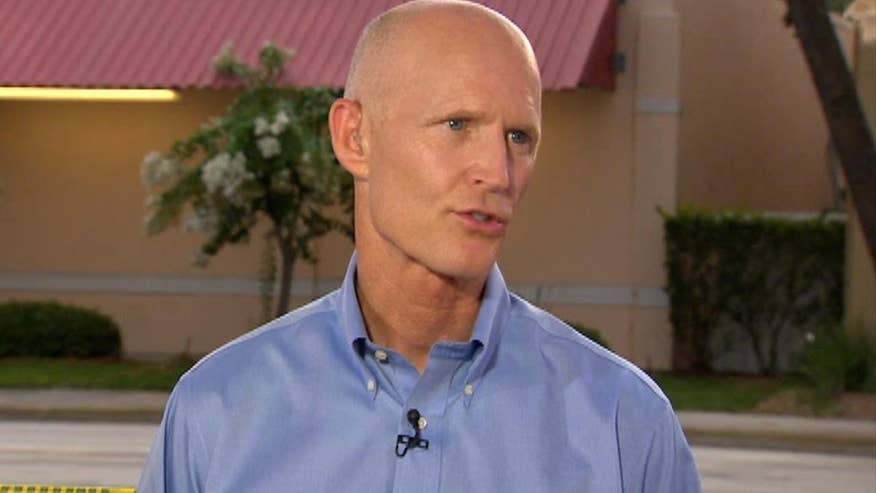Presumptive presidential nominee Hillary Clinton defeated Sen. Bernie Sanders on Tuesday in the Washington, D.C., Democratic primary -- marking the end of the presidential primary season and bringing the two candidates together for a face-to-face meeting to discuss what’s next for the party in the general election.
The Associated Press said with 99 percent of the precincts reporting, Clinton has 74,566 votes, compared to 19,990 for Sanders.
Neither candidate spoke to reporters Tuesday night after their roughly 90-minute meeting in a Washington hotel.
However, the campaigns released separate, but nearly identical statements saying that Clinton and Sanders had a “positive discussion” about their primary race, unifying the party and their mutual desire to stop presumptive GOP presidential nominee Donald Trump from winning in November.
The campaigns also said the candidates discussed issues in which they share common goals, including increasing wages for working families, eliminating undisclosed money in politics and reducing the cost of college.
The meeting, which included the candidates' campaign managers, concluded with the sides agreeing to continue to work on a shared agenda that includes developing a platform for the upcoming Democratic National Convention, each campaign said.
The latest headlines on the 2016 elections from the biggest name in politics. See Latest Coverage →
“After today, the voting is done, but our political revolution continues,” Sanders said in an email Tuesday to supporters.
Clinton clinched the nomination last week by getting the requisite 2,383 delegates -- a combination of superdelegates and pledged delegates awarded to her in 56 primary and caucus wins, including those in Puerto Rico and six U.S. territories.
Sanders has so far refused to end his campaign despite pressure to do so, suggesting he will keep trying to persuade Clinton superdelegates to instead vote for him at the Democratic convention in July, in a long-shot bid to take the nomination.
However, the Sanders campaign has occasionally suggested that the candidate could end his bid if Clinton, and the entire Democratic Party, embrace key parts of his agenda including better universal health care, a $15-an-hour minimum wage and free tuition at state colleges and universities.
Clinton said earlier Tuesday in an interview with Telemundo that she was very much "looking forward to having (Sanders') support in this campaign, because Donald Trump poses a serious threat to our nation."
Democratic National Committee Chairman Rep. Debbie Wasserman Schultz said after the D.C. primary, "Democrats are ready to unify and take on both Trump and the Republican Party that he represents. At our convention in July, we’re going to nominate a qualified, capable candidate who will build on the hard-won progress of the last seven years."
“I think the time is now. In fact, the time is overdue, for a fundamental transformation of the Democratic party,” Sanders, a self-described democratic socialist, said Tuesday on Capitol Hill. “We need a party which is prepared to stand up for the disappearing middle class.”
Before Tuesday, Clinton had 2,784 delegates, compared to 1,877 for Sanders.
On Sunday, Sanders told ABC News that the meeting with Clinton will be about “what kind of platform we have and … what kind of administration she will have.”
Sanders also told ABC that he wants Clinton to also specifically commit to a progressive tax system that makes big banks and corporations pay “their fair share of taxes.”
That Sanders, 74, even challenged the better-known and better-funded Clinton this far is a remarkable political feat.
The former first lady and secretary of state was expected to breeze through the primary. But Sanders, appearing to tap into voters’ frustrations with established candidates and money-driven politics, took the race until the second-to-last week of the Democratic primary season.
Along the way, Sanders won 21 primaries or caucuses, backed by legions of young voters and others excited by his promises of higher wages, free college and limiting the influence of “big money” in elections.
Sanders’ long-shot bid began with a key win in New Hampshire, an early primary that Clinton had won in her failed 2008 White House bid.
He showed his campaign was for real in March by managing seven straight victories, putting the Clinton campaign on its heels until late April, when Clinton won her home-state of New York.
Clinton nearly put the race out of reach with a series of early wins, including first-in-the-nation Iowa, and in delegate-rich states such as South Carolina, Georgia, Massachusetts, Texas and Virginia.
But Sanders scored a big comeback victory March 8 in Michigan that stopped Clinton’s decisive run across the South. However, he failed to sustain momentum, with Clinton winning the next seven state contests.












